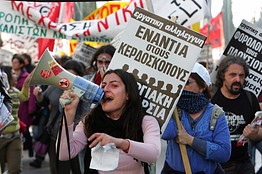
Greece workers have engaged in several general strikes over the last few weeks in repsonse to austerity measures being imposed stemming from the global economic crisis within the world capitalist system. The crisis threatens the eurozone and US markets., a photo by Pan-African News Wire File Photos on Flickr.
September 5, 2011
European Bankers Urge Leaders to Move Quickly on Debt Crisis
By LIZ ALDERMAN AND JAMES KANTER
New York Times
PARIS — As the stock and bond markets seem eerily similar to the dark days of 2008, Jean-Claude Trichet and Mario Draghi, the current and incoming chiefs of the European Central Bank, pointedly urged European leaders to move quickly to ensure that the euro zone’s debt crisis does not become seriously worse.
Europe needs to “make a quantum step up in economic and political integration,” Mr. Draghi said as the bond yields of Greece, Italy and other countries with weak finances jumped Monday amid investor fears that such efforts might be failing. He and Mr. Trichet addressed a forum in Paris that focused on the world three years after the collapse of Lehman Brothers.
President Obama will deliver a jobs speech on Thursday, a day before the Group of 7 wealthiest nations meet in Marseille to discuss the European and American economies. Washington wants to make sure that headwinds from Europe’s crisis do not cross the Atlantic while the United States economy remains weak.
Mr. Draghi’s call goes to the heart of what politicians now acknowledge is a root cause of Europe’s crisis, but that few seem ready to change: the lack of a federal fiscal union that would make the euro zone look more like the United States. The idea is something that Germany and others are wary of because it could undermine their national authority.
The calls for what defenders of sovereignty have called the “F word” — federalism — are growing louder, however, as investors warn that volatile financial markets are starting to look similar to the days surrounding Lehman Brothers’ collapse.
Mr. Trichet, who turns over the central bank presidency to Mr. Draghi at the end of October, renewed calls for a federal European government, with a federal finance ministry. Those institutions would have the power to “impose decisions on countries” whose own policies threaten the rest of the euro union, Mr. Trichet said at the Paris conference, sponsored by the Institut Montaigne, a research group.
In Brussels, meanwhile, an unusual gathering of former European leaders, academics and industrialists urged politicians to recognize that part of the answer to Europe’s ills was to give up some sovereignty to keep the euro alive.
“It has become clear that a monetary union without some form of fiscal federalism and coordinated economic policy will not work,” the group said in a statement. Its members include a former German chancellor, Gerhard Schröder; a former Finnish prime minister, Matti Vanhanen; and Nouriel Roubini, a New York University economist.
“Either the Europeans move forward,” Mr. Roubini said, or face “a situation of potential breakup or disintegration.”
Benoit d’Anglelin, a former Lehman banker for 15 years who is now a manager at Ondra Partners, a financial advisory firm in Paris, said he was seeing “extreme risk aversion now” by pension funds and institutional investors, who have been dumping “everything risk-related,” since March.
“It’s becoming unsustainable,” Mr. d’Anglelin said. “Imagine what will happen if the selling gets more serious.”
Despite pledges by European leaders in July to pump billions of euros more into a European Union bailout fund for debt-stricken countries, known as the European Financial Stability Facility, it is not so clear that parliaments in the 17 countries in the euro zone will approve an expansion.
It is also possible that a German constitutional court could throw the euro into chaos when it issues a ruling Wednesday on Germany’s participation in the rescue mechanism for fiscally troubled euro members. Analysts say the judges are likely to impose restrictions on the German government that could make decision making in the zone even more cumbersome than it already is.
It would be surprise if the panel of judges banned Germany from taking part altogether, a drastic step that would deprive the rescue fund of its biggest contributor and undermine the integrity of the euro. But the court could well require a vote by the German Parliament every time the bailout fund makes a big move.
Members of the advisory group that gathered Monday in Brussels, including Mr. Schröder, expressed strong support for euro bonds. Despite a fierce debate in Germany, Mr. Schröder said the German public could accept them — as long as there were strict controls placed on how and when they were issued.
Even if euro bonds win wider backing, there are other issues that threaten to upend plans for a tighter monetary union to support the euro. Finland has cast doubt on pledges of European unity by insisting that it receive collateral from Greece in return for aid, another issue that threatens to upset plans to expand the bailout fund. Finland’s prime minister, Jyrid Katainen, pledged Monday to resolve the issue quickly.
Europe’s leaders are acting like firefighters, Felipe González, a former Spanish prime minister, said at the briefing held in Brussels. “They try to deal with the current fire but not prevent the next.”
Liz Alderman reported from Paris and James Kanter from Brussels. David Jolly contributed reporting from Paris, and Stephen Castle from Brussels.
No comments:
Post a Comment